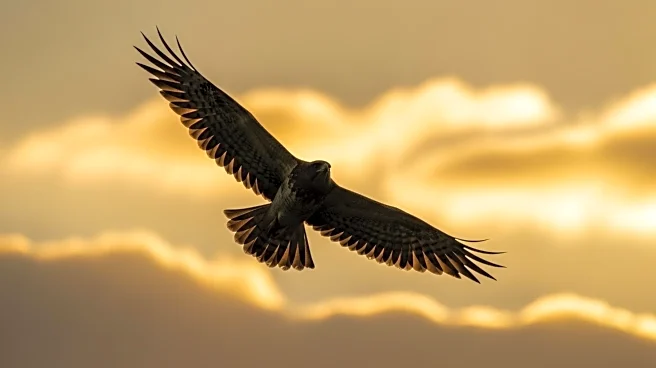What is the story about?
What's Happening?
Philippa Lowthorpe's film 'H Is for Hawk,' starring Claire Foy, delves into the theme of grief through the unique lens of falconry. The story follows Helen, played by Foy, who adopts a goshawk named Mabel after the death of her father, Alisdair Macdonald. The film, based on Helen Macdonald's memoir, portrays Helen's struggle with her father's loss and her subsequent emotional journey. Despite her attempts to maintain normalcy, Helen becomes increasingly fixated on Mabel, using the bird as a coping mechanism. The film captures the beauty of falconry and the natural world, while also highlighting the complexities of mourning and emotional repression.
Why It's Important?
The film 'H Is for Hawk' offers a fresh perspective on dealing with grief, moving away from traditional narratives centered around pets like dogs or cats. By focusing on falconry, the film underscores the diverse ways individuals cope with loss and the importance of finding personal outlets for emotional expression. This portrayal can resonate with audiences who have experienced similar feelings of isolation and emotional turmoil. Additionally, the film's exploration of grief through nature and falconry may inspire viewers to seek solace in unconventional hobbies or interests, promoting mental health awareness and the significance of personal healing processes.
What's Next?
As 'H Is for Hawk' continues to be showcased at film festivals, it may attract attention from critics and audiences alike for its unique storytelling approach. The film's reception could influence future projects that explore grief and emotional themes through non-traditional narratives. Additionally, Claire Foy's performance may garner award nominations, further elevating the film's profile. The film's success could also encourage more adaptations of memoirs that offer distinctive perspectives on personal experiences, broadening the scope of storytelling in cinema.
Beyond the Headlines
The film raises questions about the ethical implications of using animals as emotional support mechanisms, particularly in the context of falconry. It also touches on cultural attitudes towards grief and the societal expectations of emotional expression. By portraying Helen's journey, the film invites discussions on the importance of acknowledging and processing grief, rather than suppressing it. This narrative may contribute to broader conversations about mental health and the need for supportive environments that allow individuals to navigate their emotions authentically.

















